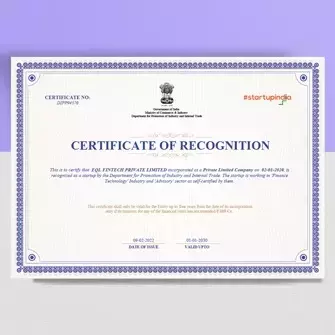Startup India is a government initiative in India to support and encourage innovation and startups. Its main goals are to boost economic growth and create job opportunities. Here's what you need to know in simple terms:
Objectives of Startup India:
- Improve infrastructure for startups.
- Simplify processes like patent filing and regulatory compliance.
- Provide tax benefits and create a conducive environment for startups.
- Increase funding opportunities.
- Build a network for entrepreneurs.
Eligibility Criteria: For a startup to be recognized under Startup India, it should:
- Exist for less than 10 years.
- Be a Private Limited Company, Limited Liability Partnership (LLP), or a Registered Partnership Firm.
- Have an annual turnover of less than Rs. 100 crore.
- Be an original entity, not created by splitting or recreating an existing one.
- Work on developing or improving a product, process, or service with a scalable business model.
Advantages of a Private Limited Company:
- Limited Liability: Shareholders' responsibility is limited.
- Distinct Legal Identity: Independent legal identity.
- Continuous Existence: Persists despite changes in shareholders or directors.
- Ease of Funding: Easier to raise capital by issuing shares.
- Tax Benefits: Qualifies for tax benefits.
- Credibility and Trust: "Pvt. Ltd." instills a sense of confidence and reliability.
Disadvantages of a Private Limited Company:
- Compliance Burden: Faces regulatory demands due to higher compliance.
- Complex Setup: Higher process and cost.
- Share Limits: Restricted share transfers; max 200 shareholders.
- Public Disclosure: Financial info is publicly viewable.
- Exit Complexity: Selling is more complicated.
- Slower Decisions: Involvement may slow choices.
Requirements for Registering a Company in India:
-
Directors and Members:
- Minimum two directors and 200 members.
- Directors need Director Identification Number (DIN).
- At least one director must be an Indian resident.
-
Company Name:
- Reflect principal business activity.
-
Address of Registered Office:
- Permanent address for business operations.
Company Registration Process:
- Acquire Digital Signature Certificate (DSC): Obtain for directors and shareholders.
- Director Identification Number (DIN): : Directors must obtain DIN.
- Name Reservation (SPICe+ Part A): Propose names for approval.
- Submission of Company Details (SPICe+ Part B): Provide information and attachments.
- Incorporation Forms (SPICe+ MOA and AOA): Draft MOA and AOA and submit.
Certificate of Incorporation: Issued upon document verification.
Document Checklist:
- For Indian Nationals: PAN card, Aadhaar Card, proof of identity, and address proof.
- For Foreign Nationals: Notarized documents, passport, and address proof.
- Registered Office Documents: Proof of business address and owner's no objection certificate.
Post-Registration Compliance:
- Adhere to post-registration compliances.
Register Your Company through Vyapar Samadhan:
Vyapar Samadhan specializes in Company Registration, providing expert guidance and support. We assist in name selection, documentation, DSC and DIN acquisition, and ensure compliance. Trust Vyapar samadhan for a seamless private limited company registration experience.
